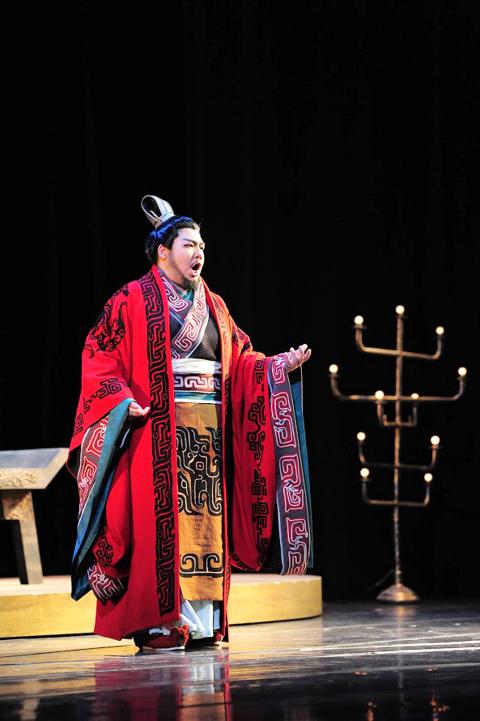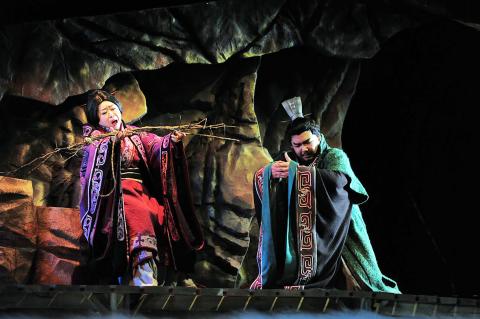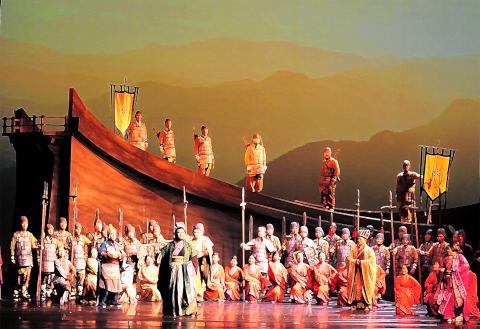Famed opera singer and director Tseng Dau-hsiong (曾道雄) has never been one to shy away from big challenges. His latest effort for the Taipei Opera Theatre (臺北歌劇劇場), a tale of family intrigue and clashing values, inspired by the Commentary of Zhou (左傳), is a coproduction with the National Theater Concert Hall (NTCH) and opens tonight at the National Theater.
A Vow to the Underworld Spring (鄭莊公涉泉會母) is set during the Spring and Autumn period of the Eastern Zhou Dynasty, about 722 to 721BC. It features a scheming mother, rival brothers, a bloody ghost and a tale of redemption — a perfect recipe for opera, be it Western or Chinese.
The 77-year-old Tseng, who was awarded the National Culture and Arts Award in 2011, is considered Taiwan’s “godfather of voice.” Over the course of his almost five-decade long career, he has been an opera singer, conductor, director, playwright, composer, producer and one of the main proponents of Western opera in the nation.

Photo Courtesy of Taipei Opera Theatre
Tseng majored in voice at National Taiwan Normal University and began working as a music teacher in a junior high school in the then-Taipei County before being called up to serve his mandatory military service. A Spanish government scholarship took him to the Madrid Royal Conservatory of Music, where he grew more interested in Western opera, and in 1970 he began studying at the Opera Workshop of the University of California, Los Angeles. He returned to Taiwan two years later and founded the Taipei Opera Theatre in 1973. In the ensuing decades he has directed and produced several operas, including two by Wolfgang Amadeus Mozart that were the first Western operas ever performed in Mandarin in Taiwan.
A Vow to the Underworld Spring is not the first Western opera that Tseng has created based on a Chinese or Taiwanese story. In 1999, he created The Scarecrow and the Thief (稻草人與小偷), which drew on his childhood in Changhua County.
The background to the opera’s plot revolves around A Vow to the Underworld Spring, the story of Wu Sheng (寤生), who grows up to be Duke Zhuang of Zheng (鄭莊公), and his mother, the Lady Wu Jiang (武姜). His was a very difficult and painful birth, which leads his mother to dislike him intensely. She much prefers her second son, Tai Shu-duan (潁考叔), and wants him to succeed her husband. However, after the father’s death Wu Sheng becomes duke. His mother asks him to make his brother the governor of Zheng’s largest city and he does, but mother and younger brother plot a coup.

Photo Courtesy of Taipei Opera Theatre
Act I gives a brief synopsis of the family’s story before moving forward with Wu Sheng setting a trap for his brother, which leads to a battle. While the fighting is going on, Wu Jiang sees Tai Shu-duan’s bloody ghost on the palace wall, who tells her he has died in battle. The victorious Wu Sheng decides to punish his mother for her betrayal by vowing never to see her again — unless they both end up in the underworld — a very unfilial thing to do.
Act II begins a year later, when Wu Sheng begins to regret his vow, but feels that as a ruler he must keep his word. One of his ministers suggests a way out: have a tunnel dug beneath a nearby mountain so Wu Sheng and his mother can meet underground.
Act III is set in the tunnel. I do not want to give away the whole plot — there is an attempted suicide and near drowning yet to come — but suffice to say that unlike many a Western opera, especially those involving ghosts, bloody or otherwise, there is a happy ending.

Photo courtesy of Taipei Opera Theatre
A Vow to the Underworld Spring stars tenor Kong Siao-cheng (孔孝誠) as Wu Sheng, Duke Zhuang of Zheng, and he will be singing all three performances.
Soprano Grace Lin (林慈音) will sing the role of the Lady Wu Jiang tonight and Sunday afternoon, while Chen Mei-lin (陳美玲) will sing the role tomorrow night. Baritones Rios Li (李增銘) and Hsu Yi-sheng (許逸聖) will alternate the role of the governor of Yinggu (潁考叔), with Li appearing tonight, and bass Julian Lo (羅俊穎) sings the role of the helpful minister.
The orchestra will be conducted by Lu Shu-ling (呂淑玲).
The opera is in Mandarin and runs about two hours and 20 minutes, with an intermission. There will be a pre-show talk in the theater lobby before each performance, starting at 7:05pm.
Despite the sky-high prices of the top seats, NT$10,000 (producing an opera is not cheap), the only seats left for the three shows are in the upper balcony, which should make Tseng and the NTCH very happy.

April 28 to May 4 During the Japanese colonial era, a city’s “first” high school typically served Japanese students, while Taiwanese attended the “second” high school. Only in Taichung was this reversed. That’s because when Taichung First High School opened its doors on May 1, 1915 to serve Taiwanese students who were previously barred from secondary education, it was the only high school in town. Former principal Hideo Azukisawa threatened to quit when the government in 1922 attempted to transfer the “first” designation to a new local high school for Japanese students, leading to this unusual situation. Prior to the Taichung First

Chinese Nationalist Party (KMT) Chairman Eric Chu (朱立倫) hatched a bold plan to charge forward and seize the initiative when he held a protest in front of the Taipei City Prosecutors’ Office. Though risky, because illegal, its success would help tackle at least six problems facing both himself and the KMT. What he did not see coming was Taipei Mayor Chiang Wan-an (將萬安) tripping him up out of the gate. In spite of Chu being the most consequential and successful KMT chairman since the early 2010s — arguably saving the party from financial ruin and restoring its electoral viability —

The Ministry of Education last month proposed a nationwide ban on mobile devices in schools, aiming to curb concerns over student phone addiction. Under the revised regulation, which will take effect in August, teachers and schools will be required to collect mobile devices — including phones, laptops and wearables devices — for safekeeping during school hours, unless they are being used for educational purposes. For Chang Fong-ching (張鳳琴), the ban will have a positive impact. “It’s a good move,” says the professor in the department of

Article 2 of the Additional Articles of the Constitution of the Republic of China (中華民國憲法增修條文) stipulates that upon a vote of no confidence in the premier, the president can dissolve the legislature within 10 days. If the legislature is dissolved, a new legislative election must be held within 60 days, and the legislators’ terms will then be reckoned from that election. Two weeks ago Taipei Mayor Chiang Wan-an (蔣萬安) of the Chinese Nationalist Party (KMT) proposed that the legislature hold a vote of no confidence in the premier and dare the president to dissolve the legislature. The legislature is currently controlled